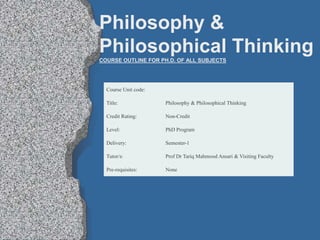
Philosophy PPT.ppt
- 1. Course Unit code: Title: Philosophy & Philosophical Thinking Credit Rating: Non-Credit Level: PhD Program Delivery: Semester-1 Tutor/s: Prof Dr Tariq Mahmood Ansari & Visiting Faculty Pre-requisites: None Philosophy & Philosophical Thinking COURSE OUTLINE FOR PH.D. OF ALL SUBJECTS
- 2. Aims & Objectives To provide basic knowledge and understanding of Philosophy. To develop critical thinking, logical analysis and the ability to make a value judgment. To equip with the ability to make arguments, give reasoning and deduct meaningful results leading to discovering universal truth. To make them able to understand moral philosophy and live with harmony in a world of different beliefs. To give knowledge and skill for the creation and application of ideas.
- 3. Learning Outcomes On completion of this course, the Ph.D. scholar is expected to have developed the following abilities and skills: Review, analyze and critically evaluate the philosophical questions that come across during the journey of conducting research and finding the truth. Appreciation of beauty, morality, truth, critical thinking and logical reasoning. Enhance vision about knowledge, beliefs as well as physical and metaphysical reality.
- 4. Key Transferable Skills Learning skills to do in-depth analysis and make a value judgment of the already available knowledge. Acquire the ability to understand and raise philosophical questions with a logical explanation. Learn about self, surroundings, truth, physical and metaphysical reality.
- 5. Course Contents The session-wise break-up of the course contents SESSION CONTENTS Session-1 Introduction and interaction Concept of Philosophy & philosophical Thinking Session-2 Definition of philosophical terms Session-3 Major kinds of philosophy (Ontology) Session-4 Major kinds of philosophy (Epistemology) Session-5 Major kinds of philosophy (Axiology) Session-6 Moral philosophy and cultural relativism Session-7 Truth and the mystery of knowledge Session-8 Mid-Term Exam Session-9 Aesthetics and beauty Session-10 Physical and metaphysical reality Session-11 Critical thinking and FRISCO approach Session-12 Critical appreciation and value judgment Session-13 Logical and critical writing Session-14 Assignment-1 (Presentation & Discussion) Session-15 Assignment-2 (Presentation & Discussion) Session-16 Final-Term Exams
- 6. Teaching and Learning Methods Formal lectures and discussions with accompanying pre-readings and activity sessions in which Ph.D. scholars break off into smaller groups. The activity groups are likely to be based on thematic reading with discussion on philosophical questions raised through readings. It will also include creating social coherence, sessions for thematic preparation, group work, lectures, slide presentations, discussions, Individual and small group presentations, and seminars.
- 7. Learning methods & techniques Group discussion, Interactive sessions, independent learning, Creative work, Material search (books/reports/documents/internet). Assignment/Essay/Project/Material preparation /Research
- 8. Assessment Both formative and summative assessment techniques will be used for learning assessment. (Formative assessment is a continuous process of evaluation during the entire course while summative assessment measures learning at regular intervals and at the end of a course. The assessment will be done for calculating your grade on the following parameters).
- 9. Philosophy and Philosophical Thinking Philosophy (from Greek, by way of Latin, Philosophia, “ Love of Wisdom”) the rational, abstract and methodical consideration of reality as a whole. Definitions • * Philosophy is the systematized study of general and fundamental questions such as that about existence, reason, knowledge, values, mind and language. • * Philosophy is the pursuit of wisdom, truth and knowledge. • * The Study of fundamental nature of knowledge, reality and existence especially hen considered as an academic discipline. • * A theory or attitude that acts as a guiding principle for behavior.
- 10. Some Renowned Philosophers Confucious (551-479 BC) Socrates (470-399 BC) Plato (428-348/47 BC) Aristotle (384—322 BC) Galileo Galilei (1564-1642) John Loche (1632—1704) Karl Marx (1818-83) Friedrich Nietzsche (1844-1900) Sir Allama Dr Muhammad Iqbal (1877 -1938 ) Jean Paul Sartre (1905-80)
